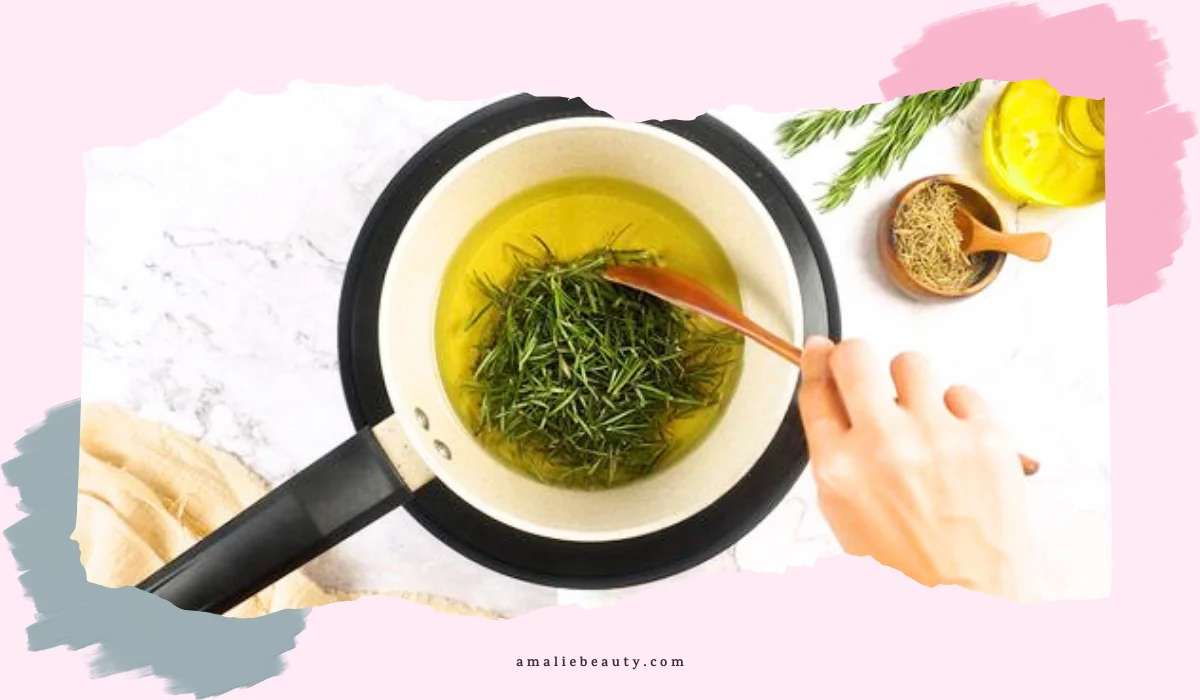Hair health is an essential part of our lives. People all over the world are getting inclined to use essential oils, considering their health benefits. It provides all of them. Rosemary oil is one of the most preferred and used essential oils among health-conscious people worldwide.
So, keep reading and dig deeper into the details about making it at home in a couple of simple steps, its effects and benefits, all over here.
What Are The Specific Benefits Of Rosemary Oil?

People usually consider using rosemary oil for hair health and scalp nourishment. And, if you’re using rosemary oil regularly, it can also increase your cognitive abilities and memory altogether. It’s also been proven that rosemary oil works as an analgesic or pain-relieving natural medication for people who have joint and muscle pain regularly.
As rosemary has a soothing smell, it has been related to reducing stress and anxiety in people suffering from those issues. The calm and soothing smell of rosemary oil helps deplete your stress receptors and makes you calm as well.
When it comes to the external benefits of using rosemary oil on your scalp, it reduces the infestation of dandruff-causing fungus in your head. The anti-bacterial effects of this oil lead to your hygienic and healthy scalp for a long time. These anti-bacterial properties are quite effective in reducing your dandruff as well, so make sure you’re using rosemary oil regularly.
Simple And Easy Steps To Make Rosemary Oil At Home
Making a perfect rosemary oil that is effective enough to nourish your scalp and provide you with the expected benefits is easy. You just have to make sure you have certain ingredients like fresh rosemary leaves, some form of carrier oil, and a sealed dark glass jar.
Make sure you have all the ingredients according to your usage, then follow these steps to make rosemary oil at your home correctly:
Step 1: Get yourself some rosemary leaves or sprigs; you can pluck them from your harvested plant, but make sure they are cleaned and free from chemicals before usage.
Step 2: Clean your rosemary leaves thoroughly with lukewarm water and dry them properly with a piece of cloth.
Step 3: Take your dark glass jar and clean it thoroughly, and make sure you are drying it as well before making rosemary oil.
Step 4: Get your carrier oil and use lukewarm water to melt it and make it suspendable. You can use coconut oil, olive oil, or almond oil as a carrier oil in your mixture, as these are the best options to make your rosemary oil more effective.
Step 5: Mix the rosemary leaves or sprigs into the carrier oil and pour the mixture into your dark glass jar.
Step 6: Let the mixture of rosemary and carrier oil cool down at room temperature with the lid open partially. It will help mix all the ingredients properly and reduce lumps in the mixture.
Step 7: tightly seal the mixture in the dark glass jar and keep it in a dark and cool room for at least a couple of weeks. This will let the ingredients infuse together and make the oil effective.
Step 8: Check if the rosemary oil smells like its fresh leaves after the infusion period; if it does, it is ready for use. Make sure to keep the oil in the dark glass jar in a cold place, which is necessary for it to retain its effects for at least three months.
Many social media influencers professionally use these steps and have been proven to get the most effective results out of them.
Also Read: Is Rosemary Mint Oil Good For Hair: Effective Results Explained!
Possible Side Effects Of Using Rosemary Oil
When it comes to rosemary oil, there are certainly very few side effects of it on people. However, there are some mild side effects of using rosemary oil in large amounts; it can lead to photosensitivity and allergies in some people. So, if you are using rosemary oil for the first time, make sure you are consulting a healthcare expert before using it.
There have been some reports of people with epilepsy and seizures getting hyperactive after using rosemary oil. Although this only happens in very rare cases, you might want to check before using it if you have a history of epilepsy or seizures.
Essential oils like rosemary oil have some uterine-sensitivity properties, which is not a good thing for pregnant women. So, if you are pregnant, you should avoid using rosemary oil until you give birth. Even if you are considering using it, consult your healthcare instructor before using rosemary oil.
Homemade vs. market-bought Rosemary Oil
Choosing between homemade and commercially manufactured rosemary oil, there are some pros and cons of using both. When you are using rosemary oil, the basic benefits are always there. Some ingredients might differ between the products you are buying and the ones you are making at home.
One of the pros of making your rosemary oil at home is you’ll have complete control over the ingredients. Another benefit of making it at home is that you can change its smell and flavor by adding other ingredients as well.
Now, it’s about getting commercially manufactured rosemary oil for your health benefits. You can get rosemary oil from the market, and it will be similarly effective as homemade oil. However, you won’t have control over the ingredients at all; you won’t know what’s inside it, and it can lead to side effects or allergies. Another benefit of using commercial rosemary oil is that it will save you time in making it at your home.
Summing Up
Rosemary oil is one of the best and most effective essential oils out there for hair and overall health benefits of individuals of all age groups. When you are considering using rosemary oil, make sure you are checking its allergic responses on your body beforehand. You can check the allergic reaction by applying it on your elbows or forearms; if any type of redness or rash appears, this oil might not be for you.

